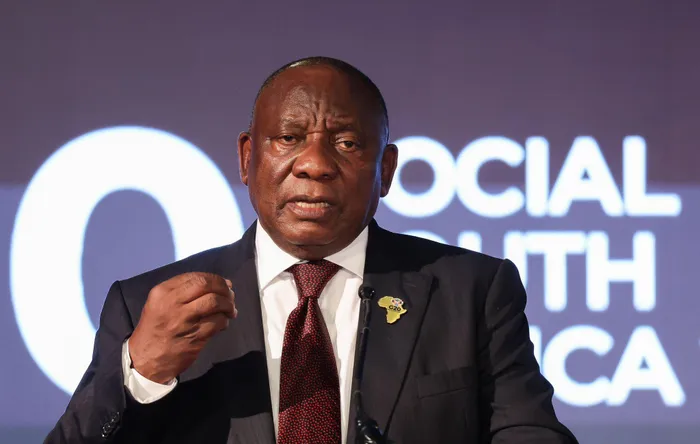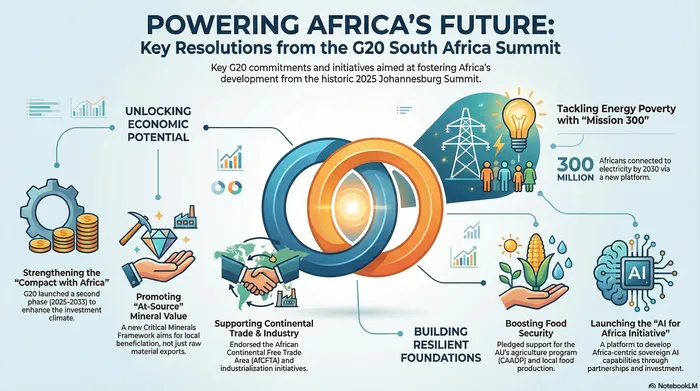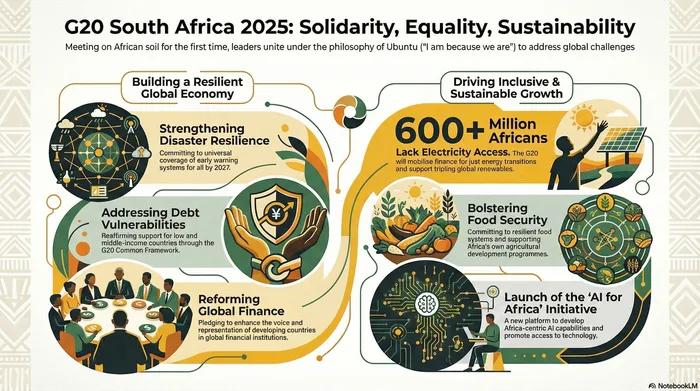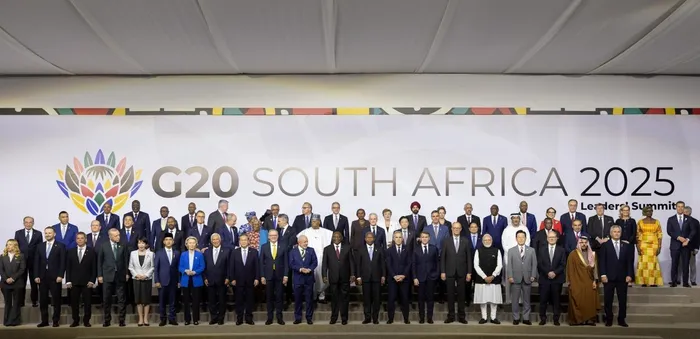Africa's Role in Global Development: Insights from the G20 Leaders' Declaration

The G20, under South Africa's Presidency, aims to tackle global development challenges with a focus on Africa, guided by the principles of Ubuntu.
Image: Presidency
The G20, particularly under the South African Presidency, plans to address global development challenges with a significant focus on Africa through a multi-faceted strategy centred on the principles of solidarity, equality, and sustainability.
This approach is rooted in the African philosophy of Ubuntu, which emphasises interconnectedness and the commitment to ensure that no one is left behind through global partnerships and multilateral cooperation.
The G20's plans for addressing development challenges in Africa include major initiatives across finance, energy, food security, industrialisation, and technology:

Key insights from the 2026 G20 Leaders' Declaration.
Image: IOL / NotebookLM
Enhancing Financial Architecture and Debt Sustainability
Recognising that high levels of debt hinder inclusive growth and limit investment in development needs, particularly for low-income countries (LICs) in Africa, the G20 is pursuing several financial reforms and initiatives:
• Africa Engagement Framework (AEF): The Finance Track launched the G20 Finance Track Africa Engagement Framework (AEF) for 2025–2030 to support the continent’s economic, financial, and related objectives. The AEF is viewed as an opportunity for enhanced collaboration and a lasting legacy of the South African Presidency.
• Compact with Africa (CwA): The G20 reiterated strong support for the G20 Compact with Africa and commended the South African Presidency for launching its second phase (2025–2033), which is supported by the establishment of a World Bank Group multi-donor fund. Efforts will be made to strengthen existing initiatives, especially the Compact with Africa, in support of the AEF. The Republic of Zambia and the Republic of Angola are noted as the newest members of the Compact.
• Debt Treatment: The G20 reiterated its commitment to strengthening the implementation of the G20 Common Framework (CF) for debt treatments. Progress is noted regarding debt treatments provided to the four countries that had requested it, including African nations Chad, Zambia, Ghana, and Ethiopia.
• African Development Fund: The G20 supports the 17th replenishment of the African Development Fund.
• IMF Representation: To enhance the voice and representation of developing countries in international institutions, the G20 welcomed the creation of a 25th chair at the IMF Executive Board specifically to enhance the voice and representation of Sub-Saharan Africa.
• Illicit Financial Flows (IFFs): The G20 commits to fighting IFFs, noting that at least USD 88 billion in outflows from Africa is lost every year, undermining domestic resource mobilisation. They welcomed the roadmap towards implementing Voluntary and Non-Binding High-Level Principles on Combating Illicit Financial Flows. South Africa is also establishing an Ubuntu Commission to promote research and informed dialogue on global public challenges.
Mobilising Finance for Just Energy Transitions and Infrastructure
Addressing the severe energy access deficit in Africa—where over 600 million Africans lack electricity and an estimated 1 billion lack clean cooking access—is a priority:
• Energy Access Initiatives: The G20 welcomes the Mission 300 platform, led by the World Bank Group and the African Development Bank, to advance efforts to connect 300 million people to electricity in Africa by 2030.
• Clean Cooking: The Voluntary Infrastructure Investment Action Plan to Accelerate the Deployment of Clean Cooking Solutions was welcomed. Members voluntarily commit to creating a conducive policy environment and reforms to support the deployment of accessible and affordable clean cooking technologies, infrastructure, and fuels, such as LPG. This is critical given that two million Africans lose their lives annually due to the absence of clean cooking fuels.
• Infrastructure Investment: The G20 supports quality infrastructure investment as a foundation for long-term development. They acknowledge the launch of the Ubuntu Legacy Initiative by the Presidency and the African Development Bank, which aims to unlock and accelerate cross-border infrastructure projects in Africa.
• Energy Security: The G20 commended the G20 South Africa Presidency’s Voluntary Energy Security Toolkit as a practical resource to support integrated approaches to energy technologies, innovation, and infrastructure resilience, with particular relevance for developing countries.

Key highlights from the 2025 G20 Leaders' Declaration.
Image: IOL / NotebookLM
Food Security and Agriculture
The G20 is alarmed that 720 million people experienced hunger in 2024 and 2.6 billion could not afford healthy diets. Focused on Africa's agricultural potential:
• Ubuntu Approaches: The G20 welcomes the Ubuntu Approaches on Food Security and Nutrition, advanced under the South African Presidency, which aim to address the negative impacts of excessive food price volatility, especially for low-income households.
• Targeted Support: Efforts are encouraged to scale up capacity building and technical assistance, along with targeted support for smallholder farmers and fishers (especially women and youth), through better access to finance, markets, digital tools, and climate-resilient infrastructure.
• African-led Programmes: The G20 supports the implementation of the African Union’s Comprehensive Africa Agriculture Development Programme (CAADP) Strategy and Action Plan and the African Continental Free Trade Area (AfCFTA). This includes investing in local food production, storage, and distribution capacities to reduce dependency on volatile global supply chains, and supporting African-led efforts to build integrated seed banks and enhance local fertiliser production.
Industrialisation, Trade, and Critical Minerals
The G20 recognises that industrialisation is a critical driver of economic growth and job creation:
• Industrialisation Initiative: The G20 reaffirms its commitment through the G20 Initiative on Supporting Industrialisation in Africa and Least Developed Countries to help African countries better integrate into global industrial, value, and supply chains.
• Sustainable Industrialisation Hubs: The High-Level Voluntary Principles for Sustainable Industrialisation Hubs are noted to support the equitable sharing of the benefits of industrialisation, including through manufacturing and beneficiation of minerals and resources at source.
• Critical Minerals Framework: The G20 welcomes the G20 Critical Minerals Framework, a voluntary, non-binding blueprint designed to ensure that these resources become a driver of prosperity and sustainable development, and to unlock investment and promote local beneficiation.
• Trade and Investment Cooperation: The G20 notes the South African Presidency initiative on a G20 Africa Cooperation Agenda on Trade and Investment, which seeks to strengthen Africa’s inclusive growth by harnessing support for the implementation of the AfCFTA, mobilising investment into Africa’s productive sector, and facilitating infrastructure projects.

Family Photo of G20 Heads of State and Government; invited Leaders and Heads of International Organizations during the G20 Leaders’ Summit, hosted by South Africa at the Johannesburg Expo Centre, Gauteng Province.
Image: GCIS
Digital and Technological Advancement
Recognising the potential of digital and emerging technologies to reduce inequalities:
• AI for Africa Initiative: The G20 welcomes the launch of the AI for Africa Initiative, a voluntary platform for multilateral and multi-stakeholder cooperation between the G20 and the African Union.
• Capacity Building: They encourage promoting access to computing power, AI talent and training, high quality datasets, and infrastructure in African countries, supporting the development of Africa-centric sovereign AI capabilities based on long-term partnerships.